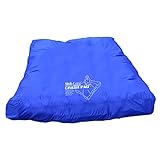Paralympics 2020 Para-Dressage
- Alanna Flax-Clark

- Jul 3, 2016
- 4 min read
I spent the next few years in and out of different hospitals undergoing daily therapies, invasive treatments, and surgeries
When I was 13 I woke up one morning and could not move or walk on my right foot. I had always been healthy, so this came as a shock. After a number of consults and progression of symptoms throughout my entire body to the point of being bedridden, in excruciating pain, unable to be touched, and my limbs developing contractures while being swollen and blue/purple in color, I was finally diagnosed with a chronic neurological disease associated with dysregulation of the central nervous system and autonomic nervous system that results in multiple functional loss in the bones, muscles, nerves, skin, and blood vessels. I spent the next few years in and out of different hospitals undergoing daily therapies, invasive treatments, and surgeries. With the support of my family, friends, and teachers, I was able to keep up with my school work and returned to high school my senior year. I managed to graduate on time and went away to college in Memphis and then to graduate school in Boston.
My immune system had attacked my nerves, spreading quickly so I was exhibiting signs of quadriplegia
I worked hard in college and double majored in Biology and Psychology as I was influenced so much by my health and how the two were intertwined. Because of my personal experience staying in the hospital so long and my interactions with all the kids and families I met, I also spent much time volunteering my time doing art projects with the kids at St. Jude Children's Research Hospital in Memphis. I also worked alongside the division chief of Radiation Oncology in the clinic and doing research on the effects of radiation on cognition, attention, and memory in children with brain tumors. While I was in Memphis things were not 100% with my health, but I was enjoying my life and did not let anything stop me. After graduating I moved to Boston to pursue my graduate studies where I obtained my M.S.Ed., specializing in severe special needs and my teaching credential. I worked full time with kids with various disabilities ranging from bipolar disorder, schizophrenia, Down Syndrome, Autism, and much more. I was enjoying life and couldn't be happier. But starting around late 2007, my health started to decline as my immune system seemed to get extremely weak. Finally, I became extremely ill with a terrible infection and ended up very suddenly in the ER with a spiking fever, my blood pressure dangerously low and heart rate dangerously high. My immune system had attacked my nerves, spreading quickly so I was exhibiting signs of quadriplegia.
Again I wanted the life that all my friends had in their 20’s. I knew something had to change
After years of working so hard with my recovery in my teens and resuming a more “normal” life, I was once more struggling and in a place of much frustration. Physically it seemed like I would never gain my independence. I was not progressing with my rehab and was only getting more fragile. Again I wanted the life that all my friends had in their 20’s. I knew something had to change. After sitting around brainstorming one day I decided I needed to try hippotherapy (horse therapy). I was never that girl running around in cowboy boots with all my breyer horses when I was younger. I knew nothing about horses! They only came into my life at a time when I needed them the most. I just knew that this was the one thing that was somehow going to help me; so I didn’t back down. From the first day I was paired up with Lusco, something changed within me. Interestingly, the movement and sensory input from the horse can be used to address things such as posture, balance, sensory integration, coordination, and mobility in people with disabilities. Once I started, I saw so many changes emotionally and physically, and I wanted to be challenged every day.
You never know what can happen in life, how quickly things can change
I’m now a Grade 1b para-dressage rider who trains with Lehua Custer Dressage at the L.A. Equestrian Center for the 2020 Paralympics. Dressage is a competitive equestrian sport where you’re required to perform a sequence of pre-determined movements with your horse. It’s sometimes referred to as “horse ballet.” Para-dressage is currently the only equestrian discipline in the Paralympic Games and was introduced in 1996, according to the Fédération Equestre Internationale. As para-dressage riders, we’re able to show and compete alongside our peers no matter our physical disabilities. You never know what can happen in life, how quickly things can change. This has given me back my life, my spirit. And my journey is still unfolding as it should be. I know I’m strong enough to handle anything and am grateful for all my family and friends who have supported me along the way.





































Comments